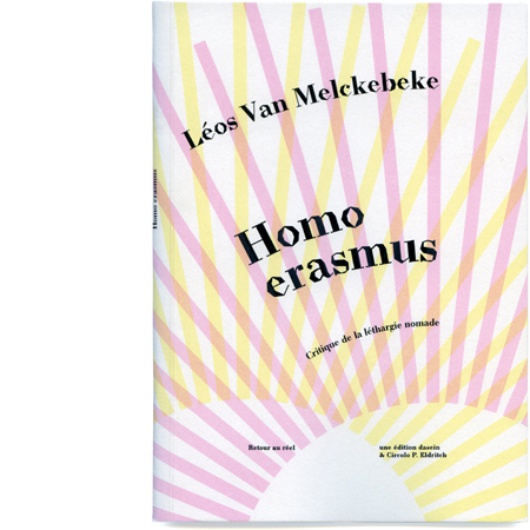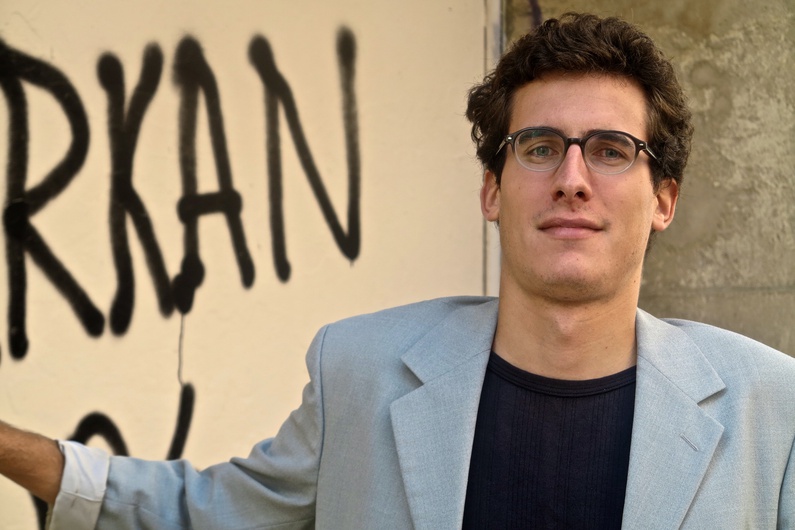
Homo Erasmus: or, Pointless Exchanges
Published on
Translation by:
Adam WyettThe Erasmus programme has raised many questions over the last three decades. However, for the first time, its legitimacy is being questioned. In his satirical novel, the 23-year-old French student Leos Van Melckebeke paints a grotesque and appalling picture of "Homo erasmus." We interviewed the controversial author, who is not afraid to speak his mind.
cafébabel: How did the idea for this novel come about?
Leos Van Melckebeke (LVM): I was 21. I was around Erasmus students when I started an Italian language course in Venice in preparation for the following year, which I would spend in Bologna. During that month, very few students made an effort to meet the locals or to speak the language, which, after all, was the whole point of being there. So I've seen how the Erasmus exchange can, in reality, be nothing like the positive picture painted by the flowery rhetoric. The book's role is therefore to shine a light on the less well known elements of the Erasmus programme.
cafébabel: What did you think of the Erasmus programme prior to that month?
LVM: I thought it was great, and I still do. It's a brilliant idea; I was just surprised by how it turned out for me and by how pointless some of the Erasmus exchanges were. Just
because you stick 20 Europeans in a room, it doesn't mean anything interesting will come of it. They'll usually end up talking drivel. Each student will be quick to push their country's stereotype and won't have made any meaningful conversation. I've never heard, for
example, a discussion on what direction Europe should take, or the problems our generation have.
 cafébabel: But there were some students who didn't share your views on this matter, is that correct?
cafébabel: But there were some students who didn't share your views on this matter, is that correct?
LVM: Right. In Bologna, I had a real discussion with some other students I met, there. There were people - Swiss, German or whatever - who had made the decision to cut
themselves off from other Erasmus students and to meet the locals. That was my reason for not taking part in any of the unenriching events put on by the infamous Erasmus societies. It's also why the book is, overall, a comical exageration of an absurd situation.
cafébabel: So you're not just protesting against the Erasmus programme, then?
LVM: No. It's just a realistic account to contrast all the uniform rhetoric pushed out there which is, inevitably, full of praise but quite frankly is not entirely true. Have you spoke to other former Erasmus students? They'll all have the same stories to tell.
cafébabel: The book seems almost autobiographical, despite not being written in the first person. Who is Homo Erasmus?
LVM: I created a character who would embody three types of Erasmus student. Homo Erasmus is, first and foremost, devised from some of the students I was observing.
Secondly, he's me. And then, thirdly, he isn't anybody, by which I mean he's just a somewhat exaggerated conception of an Erasmus student.
cafébabel: Do you think Homo Erasmus is sectarian?
LVM: Sure. In the sense that he's disinterested in the culture of the country that he's living in. They're cliquey. It's absurd, really, because when you leave for your year abroad, you go out there hoping to discover new things but you end up finding a dominant monoculture. You can easily spend your Erasmus year in Bologna without even getting to know the city, its history, the people, it's uniqueness... So it makes you wonder what the point of the trip is.
cafébabel: The point of the trip is the starting point for your book and you seem to have a very intellectual angle...
LVM: [interrupts] I go from the premise that if you travel, it's because you're curious. But nowadays, people seem to travel to impose their own values. For me, my love of travelling stems from the desire to discover new things. I'm not saying everyone is like that, it just surprises me that there are students that go travelling but aren't even curious enough to find out about the place they're staying.
cafébabel: One passage sees Homo Erasmus completely dumbstruck at a Gay Pride parade, as if he didn't know what was going on. Is your book not also a caustic criticism of your own generation?
LVM: That passage just illustrates the comic potential of our generation. When I see it, it makes me laugh. Our generation's a joke; I have no respect for them. I try to distort the reality and the serious attitudes of our generation towards certain things. If you think of Ionesco, or Molière, they made fun of their generation and managed to extract comic potential from it.
cafébabel: Right, but what's your view on our generation?
LVM: We're bored stiff. I get the impression that people, on the whole, are bored and are trying to make up for it by partying all the time for no reason. I have quite a sceptical view of modernism, of our generation, and of my contemporaries.
 cafébabel: We can say categorically that that comes across. Are you not a bit concerned that you'll come across as a grumpy old man in this book?
cafébabel: We can say categorically that that comes across. Are you not a bit concerned that you'll come across as a grumpy old man in this book?
LVM: I'm fully aware of this but, once again, this narrative is exaggerated for satirical
effect. I'm not that guy who never gets invited to parties, but I find that parties, nowadays, are quite sad and pathetic. What I hope to have done is to make people laugh. The book doesn't make any big claims; it's not some political campaign. It's just a little something.
Cafébabel: What advice would you give to a student going on their Erasmus year?
LVM: Don't get drawn in by the Erasmus associations, and try to meet the locals. But that takes a lot of effort. The problem is that, nowadays, we're not expected to make much of an effort at all. It's very tempting to follow the conventional associations and to remain among Erasmus students. But by always looking for the easy option you're only following the herd.
Translated from Homo Erasmus ou « la nullité des échanges »



